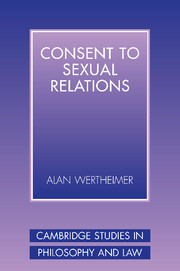Book contents
- Frontmatter
- Contents
- Preface
- Acknowledgments
- Abbreviations
- 1 Introduction
- 2 Law
- 3 The psychology of sex
- 4 The psychology of perpetrators
- 5 The harm and wrong of rape
- 6 The value of consent
- 7 The ontology of consent
- 8 Coercion
- 9 Deception
- 10 Competence
- 11 Intoxication
- 12 Sex and justice
- Appendix: Alphabetical list of hypothetical cases
- Index
3 - The psychology of sex
Published online by Cambridge University Press: 04 March 2010
- Frontmatter
- Contents
- Preface
- Acknowledgments
- Abbreviations
- 1 Introduction
- 2 Law
- 3 The psychology of sex
- 4 The psychology of perpetrators
- 5 The harm and wrong of rape
- 6 The value of consent
- 7 The ontology of consent
- 8 Coercion
- 9 Deception
- 10 Competence
- 11 Intoxication
- 12 Sex and justice
- Appendix: Alphabetical list of hypothetical cases
- Index
Summary
Why start with sex?
The discussion of the law in chapter two helps to frame the issues that motivate the need for a theory of consent to sexual relations. I suppose that one might launch directly into an analysis of consent. I prefer to begin with sex. Not because sex is more interesting than consent, although that is no doubt true. I begin with sex because the principles of valid consent must attend to the object of consent.
Why is there a problem of consent to sexual relations in the first place? Consent to sexual relations is an issue precisely because people do not always want to engage in sexual relations and because unwanted or nonconsensual sex is experienced aversively. If females were virtually always desirous of engaging in sexual relations with any other human being at any time, we would not have a problem of consent. If, as with some animals, males only desired sex when females were receptive, we would not have a problem of consent. If females did not experience undesired sex as acutely aversive, we would not have a problem of consent. To understand why consent is an issue and to understand what might and might not be plausible responses to that issue, we must attend to some fundamental differences between men and women in the way they are disposed to think and act with respect to sex and to the causal basis of those differences.
- Type
- Chapter
- Information
- Consent to Sexual Relations , pp. 37 - 69Publisher: Cambridge University PressPrint publication year: 2003



